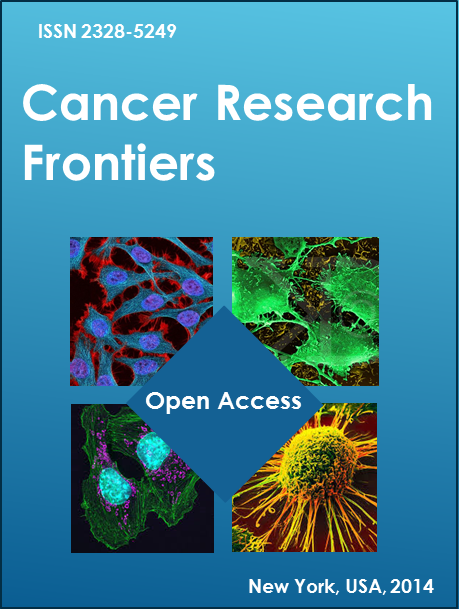Abstract _ Full Text (HTML) _ Full Text (PDF)
Case Report
Cancer Research Frontiers. 2017; 3(1): 170-191. doi: 10.17980/2017.170
Case Report of Molecular Signature in Poorly Differentiated Esophageal Adenocarcinoma
Andrew M. Kaz1,2,3,11, Christopher T. Rhodes4,11, ChenWei Lin2, Shu-Wei Angela Huang4, Chao-Jen Wong5, Richard S. Sandstrom6, Yufeng Wang4, Amitabh Chak7,8, Joseph E. Willis9, William M. Grady2,3, and Chin-Hsing Annie Lin4,10,*
Affiliations:
1 Gastroenterology Section, VA Puget Sound Medical Center, Seattle, WA
2 Clinical Research Division, Fred Hutchinson Cancer Research Center, Seattle, WA
3 Division of Gastroenterology, University of Washington School of Medicine, Seattle, WA
4 Department of Biology, University of Texas at San Antonio, San Antonio, TX
5 Human Biology Division, Fred Hutchinson Cancer Research Center, Seattle, WA
6 Department of Genome Sciences, University of Washington School of Medicine, Seattle, WA
7 Division of Gastroenterology, Case Western Reserve University School of Medicine, Cleveland, OH
8 Division of Oncology, Case Comprehensive Cancer Center, Cleveland, OH
9 Division of Pathology, Case Western Reserve University School of Medicine, Cleveland, OH
10 Neuroscience Institute, University of Texas at San Antonio, San Antonio, TX
11These authors contributed equally to this work.
*Corresponding author: Chin-Hsing Annie Lin, Department of Biology, University of Texas at San Antonio, San Antonio, TX 78249. Email:
Citation: Andrew M. Kaz, et al. Case Report of Molecular Signature in Poorly Differentiated Esophageal Adenocarcinoma. Cancer Research Frontiers. 2017; 3(1): 170-191. doi: 10.17980/2017.170
Copyright: @ 2017 Andrew M. Kaz, et al. This is an open-access article distributed under the terms of the Creative Commons Attribution License, which permits unrestricted use, distribution, and reproduction in any medium, provided the original author and source are credited.
Competing Interests: The authors declare no competing financial interests.
Received Feb 22, 2018; Revised Apr 17, 2018; Accepted Apr 23, 2018. Published May 21, 2018
ABSTRACT
Esophageal adenocarcinoma (EAC) arises from Barrett’s metaplasia (BE) in a process involving discrete genetic mutations and epigenetic alterations that remain poorly defined. An intriguing model underlying BE and EAC is that epithelial progenitor cells persist at the gastroesophageal junction, implicating dysregulation of differentiation in the pathogenesis of BE and EAC. Herein, we chose to elucidate the molecular signatures of primary poorly differentiated EAC cases. Using RNA-Seq to analyze aberrant gene expression, we found that expression of genes involved in morphogenesis and keratinocyte differentiation were decreased, whereas expression of genes involved in cell death and proliferation were increased in patients with poorly differentiated EAC. In addition, the levels of two histone methyltransferases were increased in these poorly differentiated EAC cases, including the “suppressor of variegation 39 homolog” (SUV39H) and the “enhancer of zeste homolog 2” (EZH2). SUV39H and EZH2 are responsible for trimethylation of histone 3 lysine 9 (H3K9me3) and lysine 27 (H3K27me3), respectively. Using chromatin immunoprecipitation and deep-sequencing (ChIP-Seq) to decipher abnormal epigenetic regulation, we identified putative targets aberrantly enriched with H3K9me3 or H3K27me3 in these poorly differentiated EAC cases. Moreover, comparative analysis of DNA methylation, ChIP-Seq, and RNA-Seq data suggests that dysregulation of histone 3 lysine 27 tri-methylation (H3K27me3) was the most common epigenetic alterations associated with gene expression change in a collection of poorly differentiated EAC. Importantly, our result implicates that the abundance and colocalization of H3K27me3 and primitive epithelial marker KRT-7 would present a unique signature of the poorly differentiated EAC cases. The significance of this case report highlights that defects in epithelial differentiation paradigm underscore the epigenetic dysregulation via H3K27me3, also presents potential biomarkers for detection of the poorly differentiated EAC cases.
Keywords: epigenetic repression; DNA methylation; histone modification; esophageal adenocarcinoma (EAC); chromatin immunoprecipitation (ChIP); histone 3 lysine 9 trimethylation (H3K9me3); histone 3 lysine 27 trimethylation (H3K27me3)








